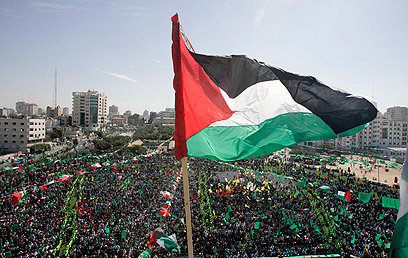

a.jpg)
Former Shin Bet Chief Yuval Diskin expressed his reservations over prisoner exchange deals on Wednesday, saying "these deals, one after the other, from Rabin to Sharon, are not good for the State of Israel; whether or not they are good for the public is a different question."
Diskin ended his term with the Israel Security Agency in April 2011. During his time as Shin Bet chief both former Prime Minister Ehud Olmert and current PM Benjamin Netanyahu refrained from green-lighting respective deals meant to secure the return of then-captive IDF soldier Gilad Shalit; despite both governments being on the verge of reaching an agreement with Hamas.
Related stories:
- Teens: Don’t exchange terrorists for our freedom
Both PMs had previously refused to free a large number of "heavyweight" terrorists as Hamas demanded. However after Diskin's replacement, Yoram Cohen, took office he was mentioned as the one who gave the go-ahead for the prisoner exchange.
Speaking before students in southern Israel, the former Shin Bet chief noted that Hamas' situation in the Gaza Strip was problematic, but "there is no doubt that the Shalit deal has raised its prestige and revived it." Diskin estimated that Egypt became a key player in brokering the Shalit deal after its position as a key regional player was weakened in an attempt to bolster its position vis-à-vis Hamas.
Diskin further criticized the government: "I believe that the State of Israel is making the wrong move by negotiating with the Palestinians. I don't know whether peace can be achieved, I'm not overly optimistic about that, nor am I optimistic about whether it would be possible to sustain a peace treaty for many years. However, the peace treaty with Egypt has been rattled as well. Not holding talks – I believe it's Israel's fault. It's losing its legitimacy, even internationally, and losing global support."
He discussed the inner workings of the Palestinian Authority, described Palestinian President Mahmoud Abbas as someone who lacks true leadership attributes, but rather as a politician. Diskin said that the world would not have invested in the PA had it not been for Palestinian Prime Minister Salam Fayyad. "Abu Mazen doesn't like Fayyad, but they live with it," said Diskin.
"When there is expectancy there is hope, but if you lose hope – terrible things begin to happen, including violence. It will effect the question of whether or not we'll witness another wave of violence in the coming months or year. Abu Mazen, the current leader, isn't entirely in good health... He's hanging on to his position because of his understanding that he might be the one able to introduce a Palestinian state to the pages of history."
Snowball effect
Diskin maintained he has not been overly impressed by the PA's statehood bid to the United Nations, but stressed that "the entire process isn't in our favor. The chance of us putting our finger in the dam and successfully preventing a flood is an illusion."
He then warned that "the day Mahmoud Abbas leaves, the relationship between Israelis and Palestinians will begin to deteriorate. The problem with Fatah and the PA is that Abbas has no evident heir. Once he moves, a succession dispute will begin and it's hard to know how it will end."
As for the volatile situation in Syria, Diskin believes that the clashes surrounding President Bashar Assad's regime will go on for quite some time.
"It won't be over tomorrow or the day after that. The Alawi minority will continue to oppress the riots in anyway possible. A lot of blood will be shed. The question is why did the West intervene in Libya but not in Syria?
"I suppose it has something to do with Syria's influence over Lebanon and Iraq, and the Americans are sensitive to what's going on over there. There is a balance of power bases on deterrence which keeps the hands of the Americans' in a bind," he concluded.
- Follow Ynetnews on Facebook
- Receive Ynetnews updates
directly to your desktop

















